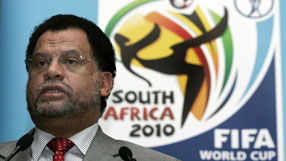Jordaan: Profiteering could hurt tourism
Spiralling prices for accommodation during the World Cup could damage South Africa's prospects of enticing tourists back after the competition, the event's chief organiser said.

South Africa hopes that the 2010 World Cup will show off the country's many tourist attractions, from game parks to beaches, and provide a long term boost to the industry, already a major foreign exchange earner.
But some owners of hotels and private homes have inflated prices by up to six times over the last few months in hope of a huge cash bonanza from the competition, sowing fears that profiteering will alienate visitors.
World Cup organising committee boss Danny Jordaan told Reuters in an interview on Sunday he was concerned by this development. "We did make that point to the tourism authorities and I will raise it again... we have to be seen to be fair."
Jordaan, in London to make a speech to a major tourism conference, added: "It is one of the things we asked the tourism authorities to look at. It's not to look at the World Cup as a once-off, but to see tourism over a period of time creating a stable and predictable basis.
"Otherwise you will get a huge influx of tourists into the country and they don't return. Unfortunately this is one of the things that has emerged around major events."
Jordaan said property owners in South Africa thought they could take advantage of the expected influx of 450,000 foreign visitors for the World Cup.
"They say it is the market forces of supply and demand. You know, huge demand and the price must go up. But I think it does not make good business sense for sustainable business. If people feel they did not get a fair deal, they will think twice about coming back."
Get FourFourTwo Newsletter
The best features, fun and footballing quizzes, straight to your inbox every week.
SHORTFALL
Jordaan said there was still a shortfall of more than 46,000 rooms over the month-long competition from June 11 but there would be no problem in making it up because this calculation was based on officially registered accommodation.
There were almost 1,200 non-graded but comfortable establishments on top of the 577 graded hotels.
However, he said there could be problems in some of the smaller host cities like Nelspruit and Polokwane in the north and Port Elizabeth on the east coast when there was a large influx of fans for big matches.
Jordaan said the problem would be overcome by transporting fans in and out by air or bus for these matches.
"That is the bigger challenge. We will have to fine tune the transport arrangements to solve the accommodation problems in the host cities."
Asked if poorer soccer fans would be able to pay the cost of transport, Jordaan said university and school hostels and small bed and breakfast establishments would be used to house them.
Schools and universities will be closed during the World Cup.
